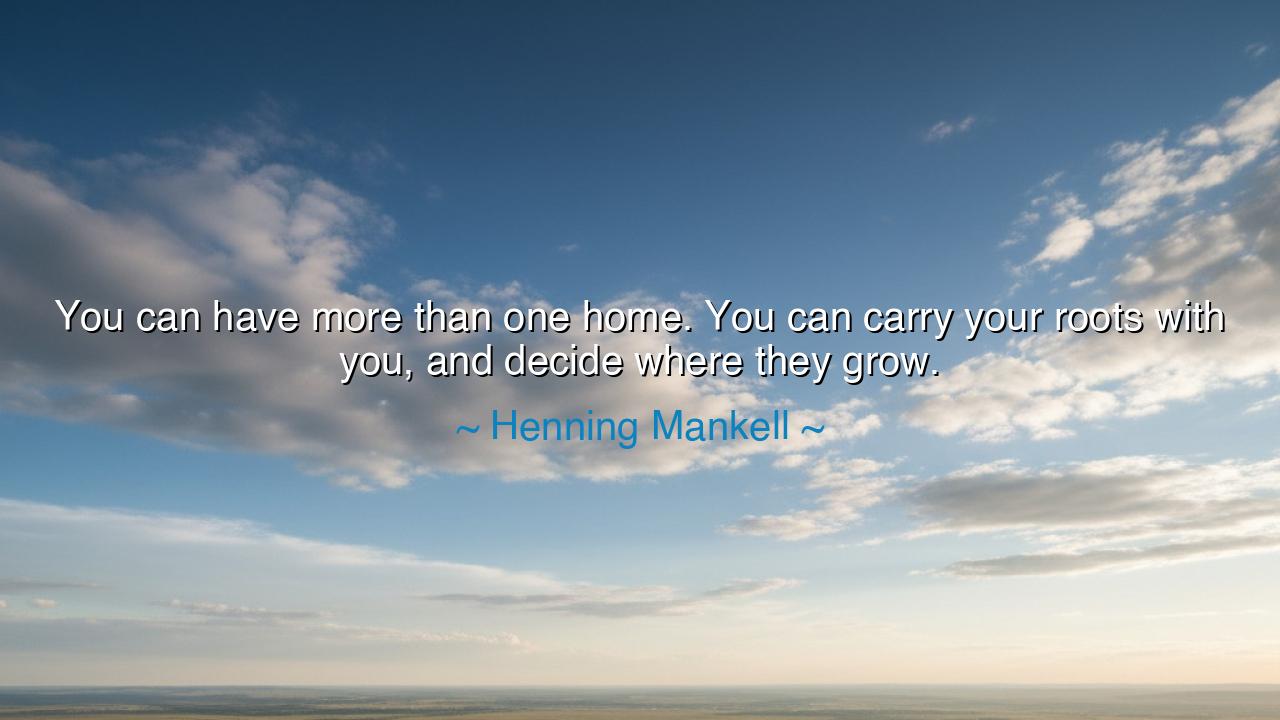
You can have more than one home. You can carry your roots with
You can have more than one home. You can carry your roots with you, and decide where they grow.






The writer Henning Mankell, whose words often bridged the worlds of homeland and exile, once said: “You can have more than one home. You can carry your roots with you, and decide where they grow.” In this truth, he captured one of the deepest paradoxes of human existence — that while our hearts are shaped by the places we begin, we are not bound to them forever. The soul is not a tree fixed to one patch of earth, but a traveler, capable of taking root wherever love, meaning, and belonging are found. Mankell’s words speak not only to the wanderers of the modern age, but to all who have known the ache of departure and the quiet courage of beginning again.
Since the dawn of time, humanity has moved — tribes crossing deserts, sailors navigating unknown seas, pilgrims walking toward the sacred. The ancients knew that home is not only geography; it is the center of the heart. To carry one’s roots is to understand that belonging is not lost by leaving — it transforms. The home of childhood, with its familiar faces and songs, remains within us, a seed of memory. But as we journey, we plant that seed in new soil, and it blooms again in different forms — in friendships, in languages, in the laughter of strangers who become family. Thus, to live fully is to become a gardener of one’s own belonging, choosing again and again where one’s roots will grow.
When Mankell wrote these words, he was speaking from the experience of a man who lived between two worlds. Though born in Sweden, he spent much of his life in Mozambique, where he founded a theater and dedicated himself to social causes. In both places, he found home — not through ownership or permanence, but through connection and purpose. He proved that one can live deeply in two lands, loving both without betrayal. His roots were not torn from Sweden when he planted them in Africa; they grew stronger, intertwined across continents, nourished by empathy and the shared human spirit. In him, the truth of his own words lived — that the heart expands, not divides, when it learns to belong in more than one place.
History is filled with kindred souls who discovered the same truth. Consider Joseph Conrad, born in Poland, who became one of the greatest English novelists, writing in a language not his own. Though his homeland was taken from him by empire, he carried it within him, transforming displacement into creativity. His novels — filled with the winds and waters of faraway lands — were his way of saying, “I am everywhere I have ever been.” Or think of Maya Angelou, who found home not just in the land of her birth, but in every place her voice was heard and her spirit was welcomed. These are the souls who understand that home is not confined by borders — it travels with those who dare to keep their roots alive wherever they stand.
The origin of Mankell’s thought lies not only in travel, but in compassion. As an artist who lived between the comfort of Europe and the hardship of Africa, he saw the beauty and sorrow of both worlds. He came to understand that identity is not diminished by expansion — it is enriched. Many fear that to love another place is to abandon their own, but Mankell teaches that love, like roots, multiplies when shared. The heart does not empty when it stretches across the earth; it deepens. To carry your roots with you is to live as the citizen of the world, loyal not to a single soil, but to the humanity that grows in every soil.
Yet this truth is not without challenge. To carry multiple homes within you is to live with the tension of longing — the knowledge that you will always miss one place while standing in another. The winds that carry the wanderer forward also whisper of what has been left behind. But this longing itself becomes sacred. It is the thread that ties together the tapestry of the soul, weaving memory into hope. For each new home we create does not erase the old; it adds another chapter to the story of who we are.
The lesson, then, is this: do not fear movement, and do not fear change. Whether you leave your homeland or simply evolve beyond who you once were, you can carry your roots with you. Bring with you the values that shaped you, the songs that steadied you, the love that made you. Let them take new form — in new friendships, new dreams, new soil. To live as Mankell describes is to live with openness — to belong not to one place, but to the earth itself.
Thus, Henning Mankell’s words are not merely about travel, but about becoming whole in motion. They teach that we are not defined by where we begin, but by how we continue — by how we plant ourselves again in unfamiliar ground and let life bloom anew. So, carry your roots proudly, but let them wander freely. For every place you love, every community you nurture, every life you touch — these become your homes. And in the end, the one who has dared to grow in many places discovers the greatest truth of all: that the entire world is home, and the heart, if it stays open, is never truly lost.






AAdministratorAdministrator
Welcome, honored guests. Please leave a comment, we will respond soon